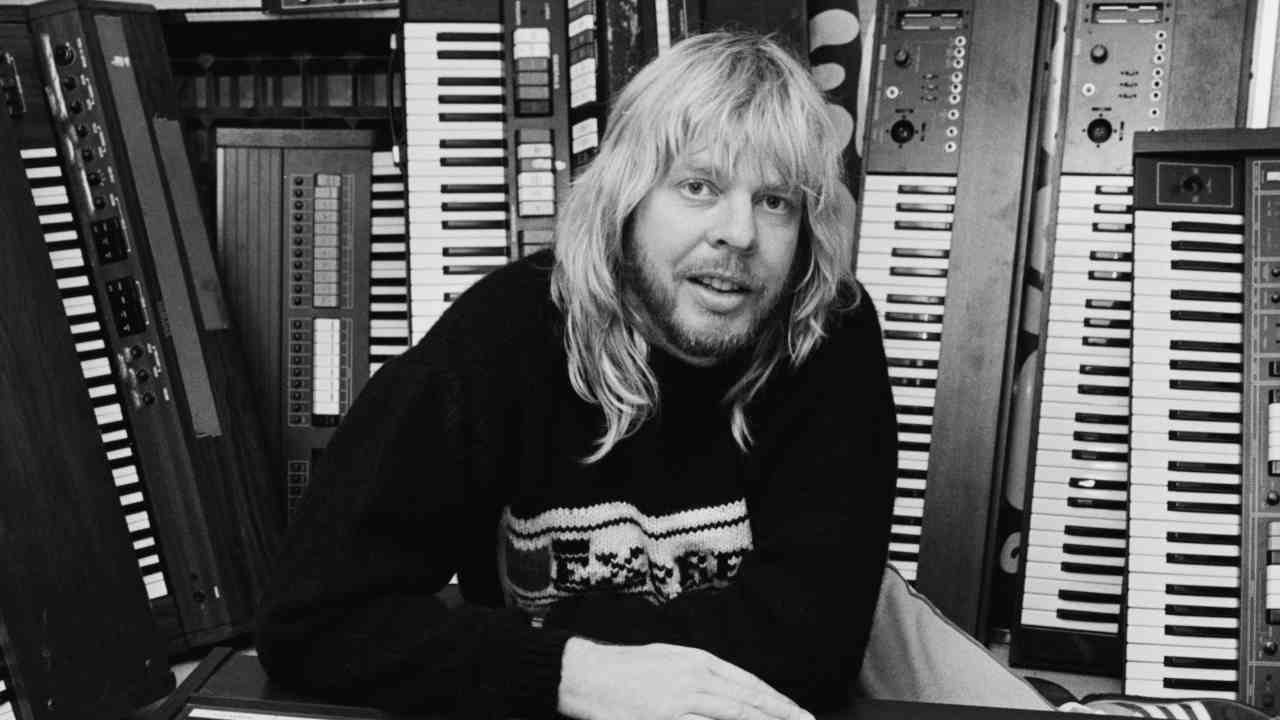
Rick Wakeman often jokes that his four ex-wives are the reason he keeps working, which might be partly true, but his enthusiasm for his music is, decades later, undiminished. Not least his first love, Journey To The Centre Of The Earth. The story behind Wakeman’s grandest work has more twists and turns than even Jules Verne’s original tall tale: a lost score mysteriously rescued and resurrected; fortunes made and lost; nearly meeting his doom at the rear of an eight-seater aeroplane and via an ill-timed heart attack… Wakeman takes it all in his considerable stride. Whether posing with a collection of his original stage capes – and delighting the studio with a selection of scandalous, off colour and absolutely off the record stories – or recollecting his not inconsiderable career in miniscule detail, Wakeman is a surprising bolt of energy. A friend to Keith Moon, Viv Stanshall and Ken Russell – all of whom he’s outlived – he’s an eminently likeable raconteur, while his enthusiasm for finally fleshing out the complete score for Journey is infectious. But first of all, there’s the matter of some sheep…
So, you’ve been driving sheep across London Bridge...
I’m a Freeman of the City of London. All the historical and heritage stuff on albums and things, it’s not because they’re just good subjects: it all really does interest me fantastically, and over the years I’ve gotten heavily involved. I’m a Freemason, I’m a liveryman in the City of London, I’m a liveryman of the Worshipful Company of Glovers, I’m a Knight Templar. There aren’t many about; if you look at the costumes, the red crosses and that sort of thing, that hasn’t changed. I can legally carry my sword and defend the faith if I want to, if I’m in the mood. Freemen, they’re allowed to take their sheep across London Bridge, which doesn’t happen too often, but the Red Cross got permission from the Bishop of the City of London to do it. It’s a daft privilege, and I thought, ‘It’s got to be done.’ Though not with real sheep.
Livestock aside, when did you first read Jules Verne’s Journey To The Centre Of The Earth?
I was probably about twelve. It was in a compendium in the school library, and it had about four or five of his books in there. Voyage To The Moon was one I remember very clearly, too. They were all translated from the French; the thing about Journey... was that, for a very simple story, it was quite hard reading in parts. I remember doing a little bit of research into Jules Verne, because there were things I couldn’t quite understand: someone trod on a rock and then he’d spend the next seventeen pages explaining what that rock was made up from. Of course, you then discover he was a scientist, a geologist and that’s where it all came from. So I learned very much to skim over parts. But I thought it was great. And that was the moment really when I knew that I wanted to adapt it in someway.
You were an early developer.
I started playing music at five, did nothing else. But when I was about eight, my father took me to see Peter And The Wolf by Prokofiev, and I was just mesmerised: it was the first time I’d ever heard a story told to music, I just thought it was absolutely wonderful. And that remained in my head from that age, the thing that I wanted to do: I wanted to tell stories to music. But, of course, then you wait for the right story. When I read it, I knew that Journey... was the story – even at the age of twelve. What I liked about the book more than anything else was that there was plenty of room to adapt it for music – to turn it into an oratorio, if you want to be posh about it.
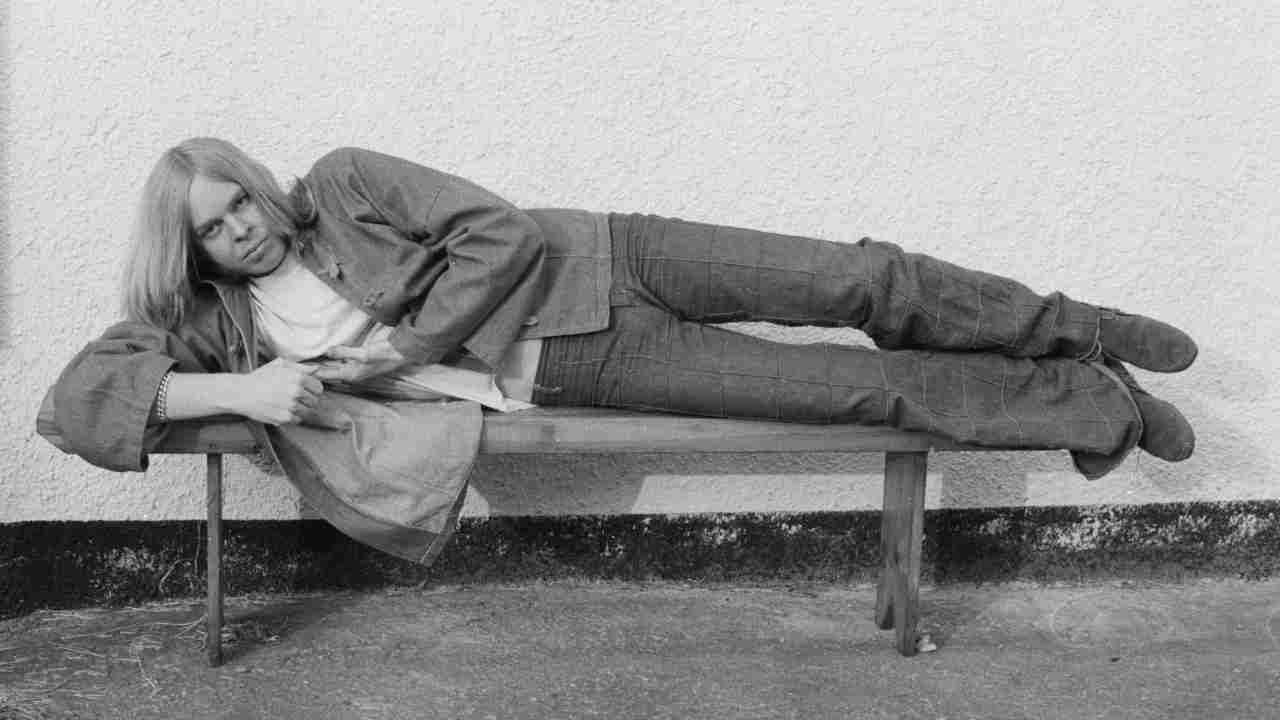
But your first solo album was The Six Wives of Henry VIII…
I got the opportunity with A&M Records to make a solo album, by default. What happened was, I was signed to A&M with the Strawbs. Back then, record labels had started to get cute because a lot of bands had been taking the labels to the cleaners in the 60s: you’d have a band, they had a massive great hit and then two of the guys leave, form another band, go and sign with someone else and the record company haven’t even recouped on the their last record! So what started to happen was, if a label signed a band, then you were signed as individuals as well, and they had an option if you left, of saying, we want an album.
So I joined Yes, we made the Fragile album and it started to sell really well in America. We were there doing a tour, we were fourth on the bill to Ten Years After, Black Sabbath and some other band, getting half an hour to play while people walked in, but we just played everywhere.
But Jerry Moss, the M in A&M, got a message to my manager at the time, Brian Lane, and said he’d like to meet me while I was there. So we went down to the lot – their office was Charlie Chaplin’s old film lot in West Hollywood – and he said to me, ‘Right, we’ve got the option to do a solo album, I think it’s worth a punt, how do you feel about it?’
I was delighted. It was on the same terms as the Strawbs contract, which was $12,500, about £4,000 at the time. Now, studios weren’t far off the price they are today: they were unbelievably expensive. So I immediately thought, Journey To The Centre Of The Earth!
I was 22 then – it was 1971, November – and I came out of the meeting and told Brian what I wanted to do. He said, ‘With that advance, that won’t even pay for a rehearsal with the orchestra, let alone record the thing. come up with something else.’ And it was actually on that tour that I picked up a book called The Private Life Of Henry VIII, and that was the start of the idea for the six pieces for the six wives. So I did that first.
Which was a huge success.
It was; it sold very well. So it came time to do the second album: same advance, but I’d made a fair chunk of money from Henry, so it thought I’d use that money to make Journey.... I had a fortuitous thing that year, which was 1973, because The Who had made an orchestral version of Tommy, which was produced by Lou Reizner – sadly, no longer with us – with the London Symphony Orchestra and the English Chamber Choir. They did some live performances at the Rainbow in Finsbury Park and I was asked to go along and play the keyboards as part of the band, as the Who weren’t playing. So I went, as some of my mates were playing: Keith Moon was involved, how we stayed sober throughout that performance is beyond me.
I met Lou, and he’d heard that I wanted to do Journey.... I didn’t really know what I was doing, he was the only person I knew who had done anything quite like it successfully. And he said, ‘I’d love to be involved, because this will be a work specifically done for band, orchestra, choir, as opposed to something that already exists that’s going to be adapted.’ He introduced me to David Meashem, who was the conductor of the LSO – he was great. Then I met Guy Protheroe, who was young then – weren’t we all – and then I met Wil Malone and Danny Beckerman, who had done the orchestration for Tommy.
Was Journey… already finished at this point?
No, I had to go off and finish it in my place in Devon that I had then. But I wrote most of it in my house at Gerrards Cross at the time. They came down to Devon, I did a demo on quarter inch, which I’ve still got somewhere – Mellotron, piano and a clavinet, I think. I just put it all together…
Did you never think of taking it to Yes?
It’s quite interesting, because I realised after joining Yes – and certainly while doing Henry – when you write a piece of music, you almost know instantly if it’s going to have a home or not. And there were things, I don’t know why, but you go, ‘That’s a Yes thing, I’ll take that in.’ But sometimes it’ll be no good for Yes, or there’s the other one, the selfish thing: a lot of stuff that we all took to Yes got dissected, swallowed, spat out, regurgitated, and looks 50 per cent different to how it did when it went in. Now, 99 per cent of the time, that’s fantastic: you’re so pleased, the way it turned out. Sometimes, though, you write something and go, ‘I don’t want that changed one iota, and if I take that along it’s going to get changed.’ So, that’s basically how it worked.
So you bypassed Yes for a pub band?
I suppose I did. I went to see Brian [Lane] about a band and he said, ‘We can give Clapton a ring, or Blackmore; Iain Paice would be great…’ He had this list in front of him. And I said, no, I’m going to try and go down another route. When people see this, they’re not going to a Wakeman concert; they’re going to see Journey.... Because when I went to see Peter And The Wolf, I couldn’t tell you who was in the orchestra or who the storytellers were; I didn’t know. So I don’t want names. And he said, ‘That’s the kiss of death’, and I said, ‘I want people to listen to it and enjoy it and not wonder when Eric’s going to do another solo. It’s not like that.’
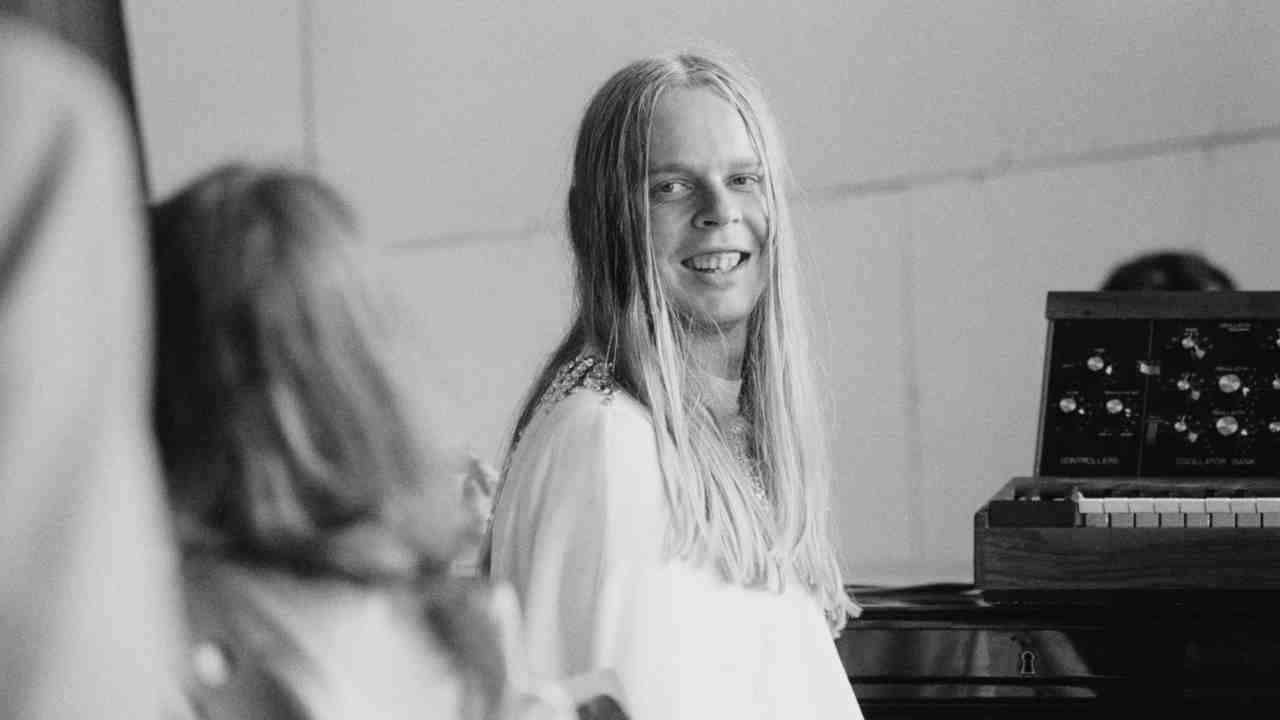
What did he say when you told him you’d met your new band in a pub?
I told him they played at the Valiant Trooper and you can’t really write what he said. He went nuts. I said, ‘I know these guys really well, they’re good guys, great players, they’ll be into it.’ Really sold them to him, and he just threw his head in his hands and said, ‘It’s the kiss of death.’ So he told me to rehearse it and not tell the band where the gig was, as they were used to playing in a pub. So I agreed to that, and told the band that I was putting this thing together and rehearsed them in a place in Chesham. We had great fun and they did a great job, and then when they asked if we were going to do a gig, I said, ‘Yeah, two shows initially, at the Royal Festival Hall’, very casual, and, contrary to what Brian thought, they went, ‘oh, that’ll be nice!’
You’re finally releasing the full version of Journey... now, but was it a struggle to cut the music back to fit a single disc back when you first recorded it?
What I did with the book… And I do this with all the things I do, all the time that I’m working on something, like Henry, say – I didn’t read any other books, apart from stuff to do with him or the wives or the Tudor period, and I didn’t listen to any other music at all. So when I was doing Journey..., I just wanted to try and immerse myself in it. I made a précis of it, just notes on the areas I wanted to cover, and there were about eight areas that I really wanted to include, good stepping stones so that it would make sense. And when I put it all together as the first demo – not everything completed, but how it was going to be – I realised that I was up to about 53 minutes, and immediately thought, well, if I make it longer, I can make a double album. But there wasn’t enough in my head to make it a double. So, I spoke to A&M, before they said they didn’t want it, and told them how long it was going to be, and they said they wanted a single album. So before I went any further, I had to look at specific areas to pull out, because I already needed to dump sixteen or so minutes. Which is not that easy to do, but I did it, and two songs that I was in the process of writing, I knew I could pull them. It did leave a funny gap, but it still worked, so they went – they were never even recorded or rehearsed or even finished properly.
You initially had a different narrator in mind for the original too, didn’t you?
The actor, Richard Harris. And then, in the December, he called up, very apologetic, but he was getting married and going off on honeymoon and so wouldn’t be around. So that was a huge panic, a really important part of the show. I wanted a real storyteller voice, so we went down the classic route, looking at different actors, and at the time my manager was Brian Lane, but we were part of the Hemdale Group in Mayfair, which was a guy called John Daley, and his partner was David Hemmings, hence the Hemdale. In that group were people like Sabbath, Jack Wylde; a real mix.
So, we had this emergency meeting with Brian and myself and John, going through a list of possibles, and the concert was in something like two weeks time. At that moment, David Hemmings walked in. We told him what was happening and asked if he could think of anybody. And he said, ‘You’re in my office, you’re looking for an actor with a voice… So have you not thought of asking me, for fuck’s sake?!’ I said to him, ‘I can’t believe that we never thought of you, would you do it?’ And he just laughed and said of course he would, and he was wonderful. It was very funny, because we did the rehearsal and he turned up with a black eye, because his wife of the time had caught him doing some extra office work with his secretary and given him a whack. The press were after him to try and find out what had gone on, and it was my then-wife who administered the brilliant make up that helped him get away with the black eye during the show.
When did you first rehearse with the orchestra?
The problem was, I couldn’t. Even with the money I’d earned from Henry, I couldn’t afford to do it in the studio, so the only way it could possibly be done was live. So what we did, we went for a six o’clock show and an 8.30 show, and thought that if we recorded both shows we’d cover it. And I brought in Keith Grant from Olympic Studios, as he was the most experienced engineer in the country then, to record it. It was unbelievably complicated to record back then, but as Keith said, ‘The great thing about it is that we’ve got two cracks at it, so we should be able to mix and match and make something out of it.’ Then we were informed half an hour before the first performance by the powers-that-be that we could only record one of the shows. They wanted a lot more money to record it, the orchestra, and we just didn’t have the money. In fact, on the day of the concert I’d actually not only spent all of the money I’d earned on Henry, but I’d re-mortgaged the house absolutely lock, stock and barrel: I’d sold everything thing I had to pay for it. In fact, on the day of the concert, I got a writ from Express Dairies because I hadn’t paid the milk bill for two months.
You were at the bottom, looking up…
I was. But that was probably the best thing that could have happened, because otherwise the album would never have been released. We recorded the one show, the second. I mixed it at Morgan Studios, and it was the most difficult mix ever, because there were so many mistakes and things that had gone wrong, and you couldn’t bring people in and do ‘drop-in’ stuff, so we had to deal with what we’d got. We did what we lovingly referred to as jigsaw edits – you can edit on two-inch tape, just by slicing across, but this was like a huge jigsaw going back twenty, thirty feet with little strips of the tape, ribbons of the stuff. It was unbelievable how the hell we did it. It took three solid weeks, and what we ended up with was quite interesting because it had mistakes in it, it had split notes from the orchestra, some timing was off – but it had an atmosphere about it, which I just loved and I thought it was so honest, and I really liked it. And then by this time, quite genuinely, I’m broke, totally and utterly broke. So I took it to A&M Records in London and the then-boss heard it and said, ‘I don’t like it, not going to release it. No one’s going to play one track, an orchestra and choir… No, not going to put it out...’
You must have been devastated.
Absolutely. I remember going to see Brian Lane, and I was in despair: I’ve got a house that’s now probably mortgaged for more than its worth, I’d borrowed everything, stolen everything, sold everything, I got more debts piling up… And now they’re not going to release it! So you can imagine the state I was in. I often wonder, had I been a wealthy boy and not had to use all that money, if I would have gone, ‘never mind, I don’t care, fuck it’, and moved onto something else. But Brian, to his credit, was very bright. He’d had a think about it and said, ‘you’re in an unusual position: you’re signed to America, because Jerry Moss signed you over there, so it’s America’s decision.’
So Brian spoke to Jerry directly, and I know this sounds daft, but back in 1974, you couldn’t just pick up the phone and call America, you had to book a call, it was a bit of a nightmare. He finally got through to Jerry, who said ‘send it to me to listen to, and I’ll make a decision.’ So it was a cassette, which took a week to get there – so there’s more waiting around – and then we got a call from Brian saying he’d just received a telex from Jerry that he’s informed A&M in London that they were to release the album. Now that created a bit of a problem, as you can imagine, because it was almost like we’d gone over the boss’ head. So it didn’t go down too well, but there were some people who worked there who loved it and they were very behind it.
You must have been astounded by success of Journey... when it was released – or did you take it all in your stride?
For anything to work, you need a team around you who truly believe in what you are doing and trying to achieve. I was lucky enough to have that. My management believed in Journey..., my band believed in it, all involved in the recording believed in it and Jerry Moss really believed in it, and that certainly played a massive part in motivating the people who worked for the label.
How did the score get stolen?
No idea, although I now have a feeling that most of the music was probably destroyed. Back in 1975, all the printed music for Arthur and Journey... was kept in two massive flight cases that travelled wherever we went to play. One of the final performances was in South Africa in 1980, when I was signed to MAM management. When I returned to the UK, the music went into storage at a facility MAM had. Within a couple of years, MAM had gone under following a very prolonged court case that had been brought by Gilbert O’Sullivan, oddly enough. My life was in turmoil at the time, and with orchestral rock being about as popular as rotten eggs in a perfume factory, all thoughts of performing Journey... or Arthur again faded into oblivion. In the late 80s I was approached by a Russian promoter who wanted me to perform Journey... in Moscow; I was really excited. Then the problems started. MAM was gone, and so was their storage facility. Much of my equipment was also stored there. At least six years had past and there was nobody left from the company who had any idea what happened to my flight cases, and that was that. I had to tell the Russian promoter that it couldn’t be done.
I didn’t give up though. I put out messages to everybody I could think of, to see if anybody might know where it was. I contacted the conductor, David Measham, who didn’t have a copy of the score. I contacted the orchestrators, Danny Beckerman and Wil Malone; they didn’t have copies. Everything was in the flight cases. You have to remember, this was way before the days of computers, everything was written by hand. To this end I contacted the copyist, only to discover that tragically he had committed suicide. I was beginning to realise that I was fighting a losing battle, and so gave up the search. There were occasional rays of light, such as a guy in Brazil who said he had the score of Arthur. He wanted money, I wanted the score, he wanted the money before parting with the score, so I asked to see a scan of some pages, so I knew he was genuine. But that was the last I heard.
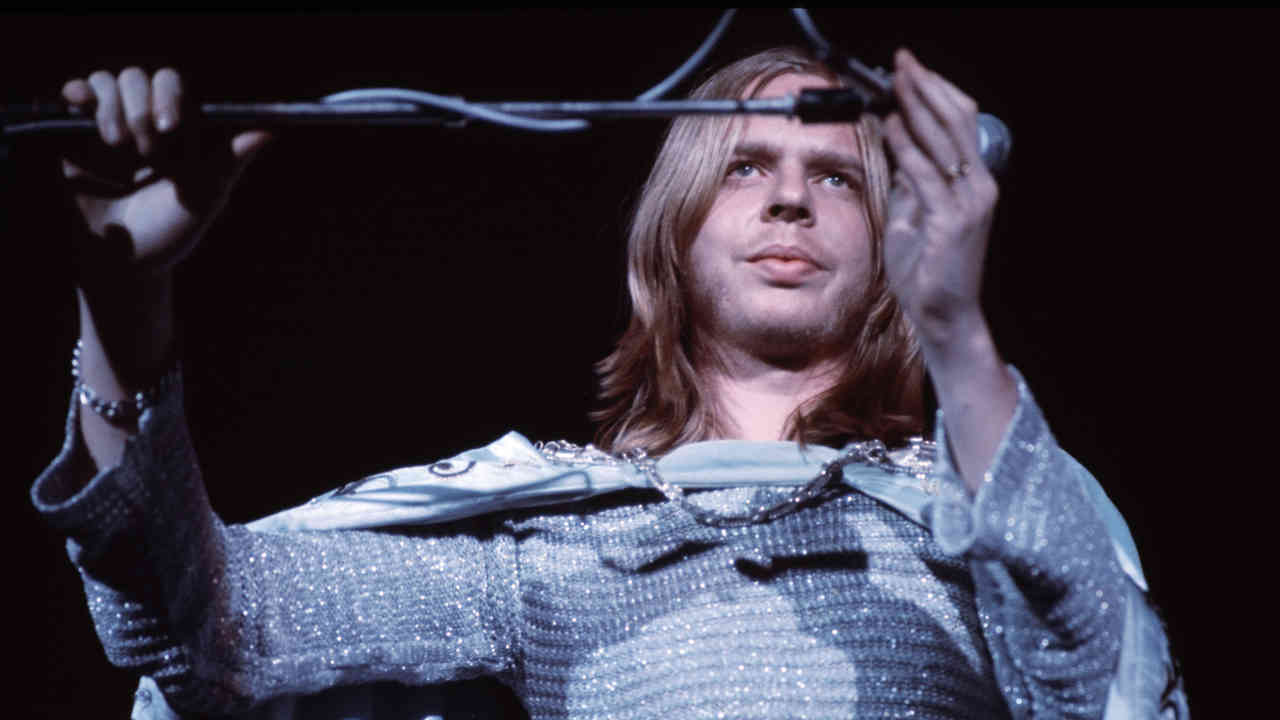
In 2008, it materialised again on your doorstep. How?
To be honest, I truly don’t know. In 2005 I moved to Norfolk, and boxes of stuff started arriving from all my previous homes! Stuff came from Switzerland, the Isle of Man, and all these other storage places, and slowly I started emptying them; with more than 200 large boxes to sift through, this was not a quick job. Eventually I came across a box I did not recognise at all – it didn’t match any of the other boxes in any way. It was very damp and fell apart when opened. It was full of music, most of which was not mine and I didn’t recognise at all. Most of it was very sodden and just fell apart when I lifted it out.
I was just about to throw it all in the skip when for some strange reason something inside of me told me to carry on. I did and found more sodden music I didn’t recognise, and then at the very bottom was something I recognised immediately. It was David Measham’s conductor score. It was sodden and looked like a piece of papier-mâché. I stared at it for a good five minutes and then called my good friend and musicologist Guy Protheroe, who also runs the English Chamber Choir and conducts for me. He told me to get it to him as carefully as possible and he would see what he could do, to salvage as much as he could. I let it dry out naturally and took it to him and over a period of a year he, and his wife Ann, managed to transcribe all the original music onto their computers using Sibelius [a musical notation program], and so once again, Journey... existed.
How did it feel to hold the score in your hands again?
Quite surreal; I truly thought I’d never see it again. Now I can only hope that the Arthur score is still in one piece somewhere, and perhaps will turn up too. I still shake my head over the discovery of the Journey... conductor’s score, and intend to frame it as soon as I get the chance.
You kept the original notes and ideas from 1973 though, what were they like and how did they stand up after all these years?
I always make tons of notes and do a lot of research whenever I am doing a concept album and also, because it was such a mammoth task back in 1973 when I wrote it, I can recall almost every moment of where I was when I wrote certain bits. The missing songs were never completed, just the outline of what they were going to be, plus notes on the areas of the book that involved them. I knew what they were, so didn’t really have to rake through them.
Can you talk us through the four original movements and how each piece materialised, and how you saw it in context of the book/source material? Were any pieces easier to compose than others?
I never knew how it ended up being divided into four pieces. On the vinyl there are no scrolls, so it’s impossible for anybody to decipher which bits are what anyway! There were also more titles for the different sections, and I don’t to this day know how it ended up being split into four bits! On the ‘new’ Journey To The Centre Of The Earth, we’ve put that right.
There were no bits easier to compose than others, as I always treated it as ‘a whole’: all the music had to seamlessly join, and so I actually wrote it in order, starting at the beginning and finishing at the end!
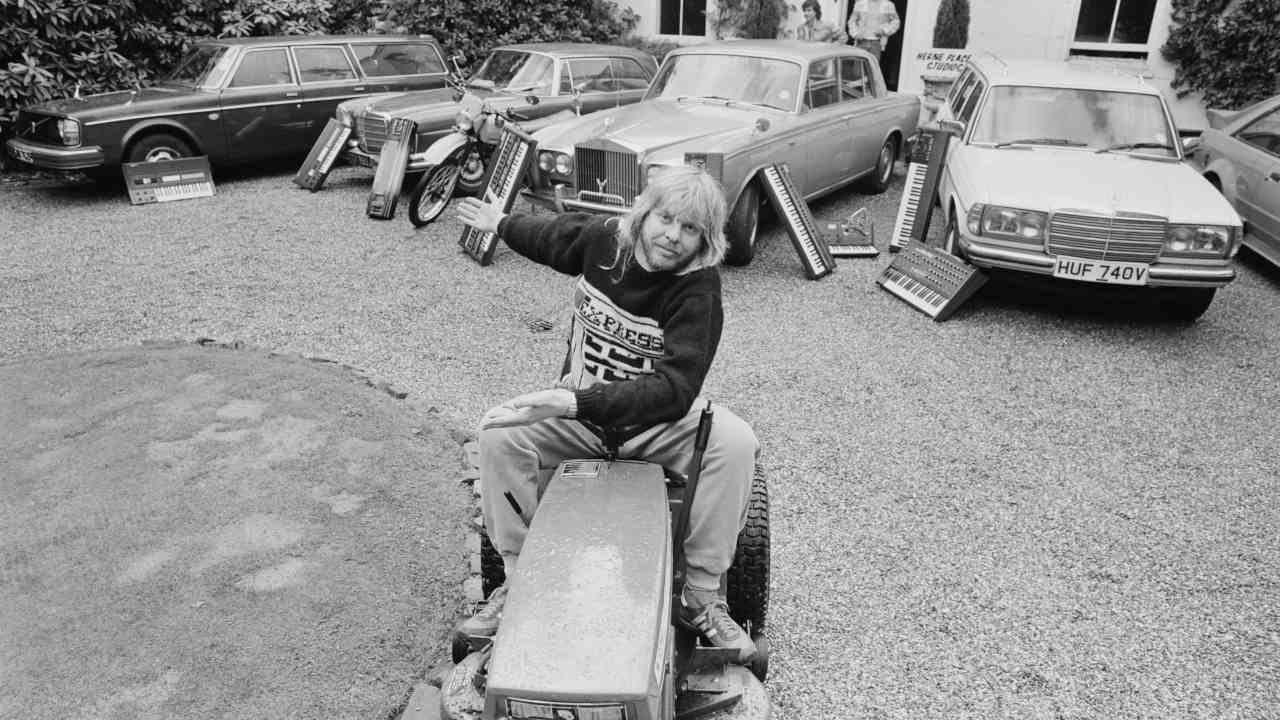
Is it true that the tour was a huge success, but it still cleaned you out? And did you know before you booked the tour, that that would be the case?
True enough, and I knew that from the outset. But back then, you toured to promote the album, and hopefully you then sold more albums and more people got to know about your music. Most tours were done as a loss back then; it was a form of advertising. The amount of albums sold, though, more than compensated for the tour losses. I’d do exactly the same thing again if we still had proper record shops!
After Crystal Palace Bowl, you suffered a heart attack… What happened?
I hadn’t been feeling well. I’d been quite numb, in fact, all through the day, but I put it down to tiredness, and possibly a slight overindulgence in the amber fluid! I’d had no sleep for days, either. I came off stage and don’t remember much really; I sort of passed out. I came to, feeling very numb and being given water to drink. I didn’t stay for the after show party and got in my car, which was the big and powerful Mach 1 Mustang, and drove home at 25 miles an hour, as I felt so bad. Must have looked strange, this muscle car being overtaken by bicycles.
I got home and went to bed. In the morning I was on the phone doing an interview for Melody Maker, when I felt as if I was going to keel over again. I managed to get up to bed. The doctor came and the next thing I knew was that I was in an ambulance. Ironically, my band had just arrived for a meeting as I was being loaded in to the ambulance. I remember shouting to them; “I’ll see you in the Packhorse pub in an hour; this shouldn’t take long.” It took nine weeks before I was out of Wexham Park Hospital and back in the Packhorse pub!
You wrote the King Arthur album while you were laid up, and said it was as much about you as it was Arthur, what did you mean?
A lot of it became almost autobiographical; I realised, while I was writing it, that much of it mirrored my own life in many ways. That’s it, really. I don’t think it’s possible for anybody else to understand what I mean when I say that...
Not long afterwards, you scored Listzomania for Ken Russell. how was he to work with? how did you get the gig?
Ken just asked me to do Listzomania; I loved being involved. I learned so much from Ken; he was very generous with sharing his knowledge. I did Crimes of Passion for him too, which was also great fun.
I saw him a few weeks before he died, and I couldn’t help but be saddened by the terrible way the British film industry treated him. Of course, after he died, they all turned around and said how wonderful he was. Admittedly, he could blow hot and cold. He’s on record as saying he didn’t like what I did for him, and in another breath saying he loved what I’d done and I was a pleasure to work with. He was very much how he felt on the day was Ken!
Did you enjoy scoring films? It seems like the perfect medium for you.
I love doing films, but the trouble is there are not that many on offer to people like me. I’ve done twenty or so, and have enjoyed all of them. I’m doing one at the moment. I would very much like to be able to have one a year to do.
You seem like the kind of artist who’s always moving forward; it never appeared likely that you’d be satisfied staying with a band like the Strawbs. Was that the case?
The Strawbs started moving toward the ‘pop’ side of things, and that never sat comfortably with me. I loved the band as a folk rock band, and am so pleased that is what they eventually returned to. Dave Cousins’ writing is superb. I am a huge Strawbs fan and always will be. Dave and I are still great friends.
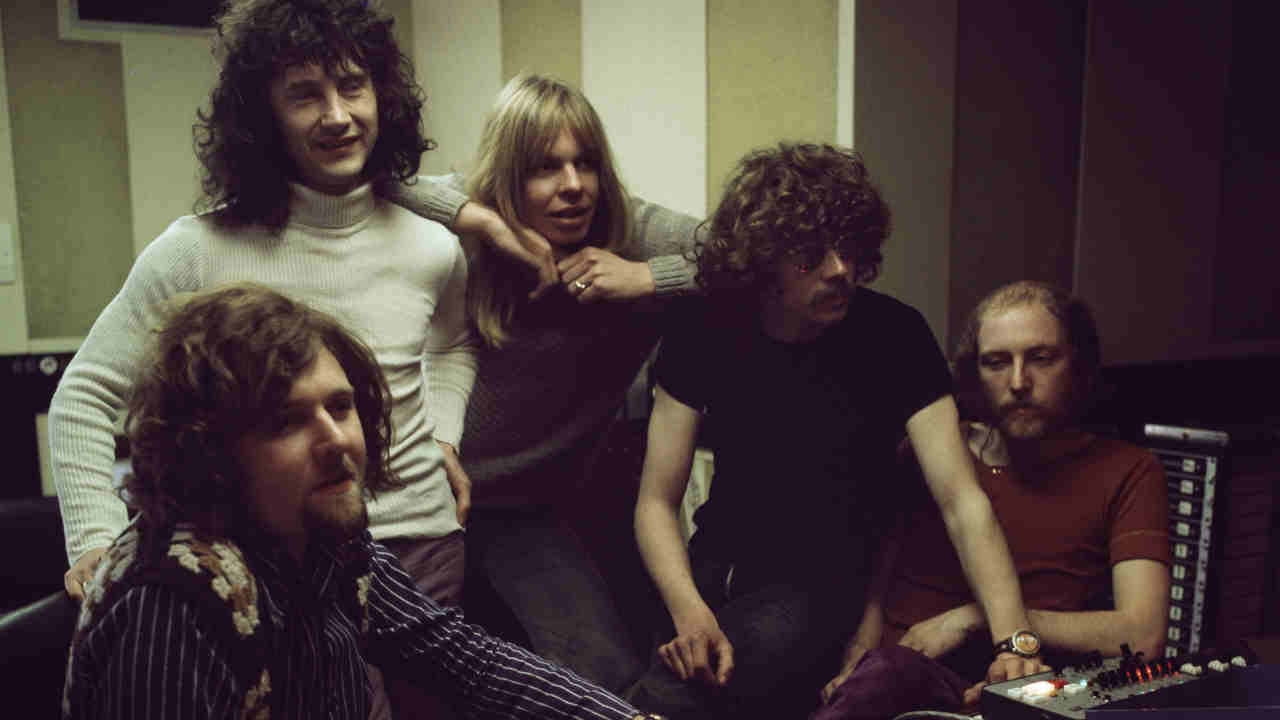
Back then, the Melody Maker put you on the cover and pretty much called you the second coming… Did you believe the hype? Did it all go to your head?
Funny one, that… I lived in Gants Hill in Essex, in a basement flat. Every Thursday I would get on the Central Line train and go to Tottenham Court Road, where right outside the station the news vendor would have the first copies of the Melody Maker. I remember doing my usual Thursday trip and buying the magazine before going back down to get the train back to Gants Hill.
Funnily enough, I didn’t look at the front cover but opened it up to the album charts page to see where the Strawbs album, Antiques And Curios was, or indeed to see if it was in the charts at all. I remember that two people opposite me were staring at me. True, I had very long hair and dressed a bit weird, but it did seem odd, so I sort of grimaced back, I think!
Eventually, around Stratford, I turned back to the front cover and realised why the people opposite had been staring, as I was on it with the headline, ‘Tomorrow’s Superstar’. I remember being quite thrilled, but also quite embarrassed, and I folded it up until I got home to be greeted by my landlady, Mrs. Cleary, kindly informing me that my £8 rent was due. I earned £18 a week with Strawbs and that week I’d spent it all, so I mumbled something about sorting it all out tomorrow and ran to the kitchen. It’s amazing how when something really good happens, reality has a nasty habit of rearing its ugly head.
My dad, as always, put everything into proportion. “Make sure you deliver son, and don’t let it go to your head and never let anybody down”, he said. “Couldn’t lend me eight quid, could you?” was my reply.
Tell me about your involvement with the American soccer team, Philadelphia Fury… Was Peter Frampton involved too?
I think it was 1976, and the first proper soccer set up was being organised in the USA. Phil Woosnam was the first soccer commissioner and various franchises were put up for sale. Along with Frank Barcelona, the agent who ran Premier Talent, the biggest agency in America, my manager Brian Lane, Peter Frampton and a few others – eleven of us in all – bought the Philadelphia franchise. Absolutely wonderful. Cost me a fortune, but I met some wonderful footballers, and was responsible for many of them going to America, people like Alan Ball, Frank Worthington, Peter Osgood, Terry Mancini and Johnny Giles.
You’ve been involved with football, one way or another, for years...
I was a very proud director of Brentford for a year, but that went sour for a few reasons, and in retrospect I was as much to blame as they were. I still follow their every move. I also follow Man City, which I’ve done ever since my youngest son Oscar became fixated with them twenty-four years ago. They are a great club, and the supporters deserve all the success they are having now. If I was rich I’d try and replicate that with Brentford.
When did you discover your love of golf? that came to you later, right?
I was 35 when I started. I had given up drinking in August 1985, and needed something in my life to replace the many hours in the bar. I had actually been playing golf badly for about a year or so, and then joined Sparks, which is a wonderful charity specifically helping babies and young children. Sparks have loads of golf tournaments each year, and I joined as a patron and play as many games as I possibly can for them. I have also hosted my own tournament for them for the last seventeen years.
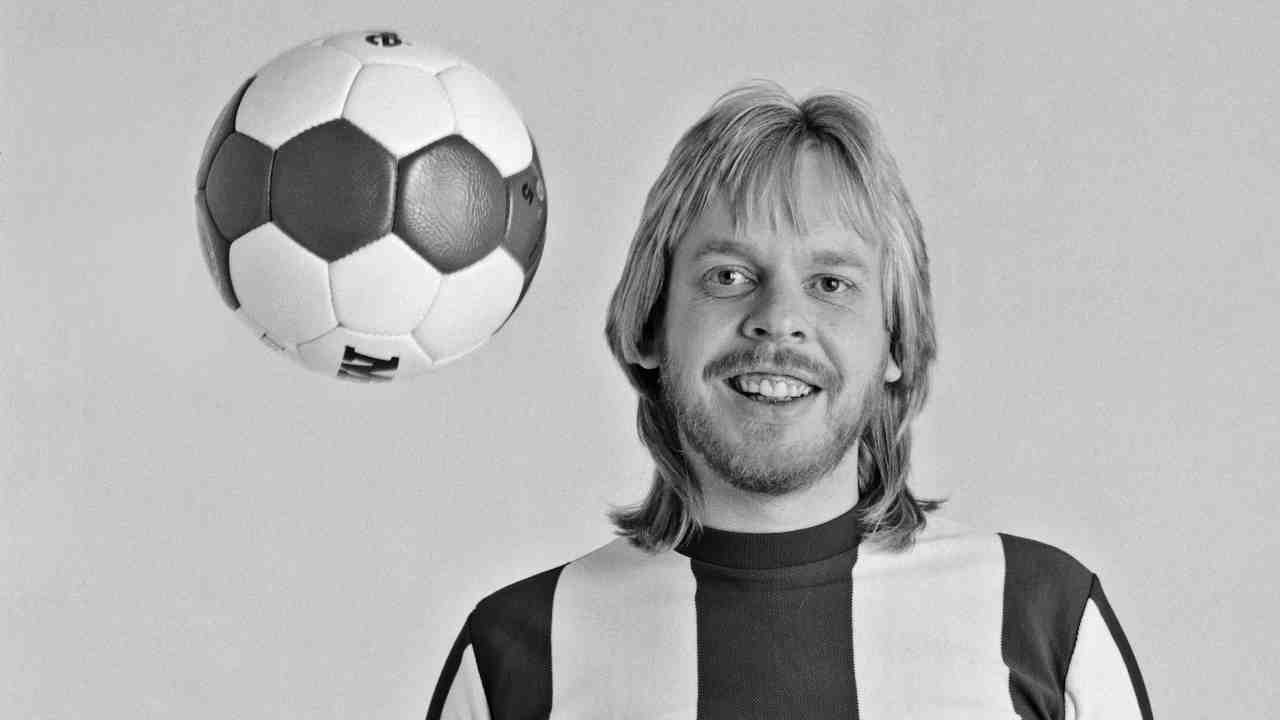
It was in 1984 that you lost your driving licence because of the drink, wasn’t it?
It was. Amazingly, I was only one point over the limit, but the law is black and white. The legal limit back then was 80 milligrams in your blood, and I was 81. Glad it happened, though, as it taught me a big lesson in life.
In 1985 you collapsed while in Australia, and that was the end of the booze. How bad had it got?
My body had had enough. My organs were shutting down, and so was I. By the time I got home, I had lost three stone in the final three weeks of the Australian tour. I was falling asleep onstage and couldn’t hold down any food. I went to a specialist doctor immediately on my return and he gave me six months to live, unless they could get my body working again. I never drank again.
Your contemporary, Keith Moon, enjoyed a drink, too... How did you two meet and become such firm friends?
Moony was just wonderful. We had more than a few drinking sprees and, to the best of my recollection, most ended up in a police station. The best was in Australia, when I was on tour with Yes and Moony was doing the orchestral version of Tommy down there. If you want to know the story though, you’ll have to come to a one man show where occasionally I tell it. It’s a classic!
Did Moon’s death not make you cool the drinking down?
No, not at all. Same with Viv Stanshall when he died – he was a friend and a heavy drinker. We are all individuals and should make decisions based on our own lives, not those of others.
How much did the touring and lifestyle affect things
at home?
Drastically. It’s impossible to have a home life if you’re on the road all the time. It’s a balance that can never be achieved.
Considering your television career, have you always seen yourself as an entertainer?
Most of my mates were comedians, and I discovered back at school that people thought I was funny. I liked telling silly stories, and indeed, at school, I entered the school debating society and spoke in favour of the subject given, ‘Women At Work.’ I concentrated heavily on massage parlours and red light districts. It took place in front of about 200 parents. The men laughed uproariously, and a few of the women too. The English master, headmaster and deputy headmaster didn’t, and I was banned from speaking at future debates. I was twelve.
Did the TV and radio side keep you afloat for a while?
I’ve never been afloat in my life. Every penny I earn is ploughed back into what I believe in, plus the odd fetish for cars. Although I don’t have Ferraris and the like anymore, I hasten to add!
You were involved in a plane crash in 1996 going into Derry. What do you remember about that incident?
Didn’t have much time to think really. We were coming into land in this eight-seater when it sort of went quiet and the pilot shouted back, “Oh shit! We’ve lost all power and the fucking undercarriage front wheel isn’t down. Oh shit!” And then we hit the runway. The pilot had actually been brilliant, and glided the plane down from the last 300 to 400 feet, and we landed on the back wheels. And then there was a rather large crunching nose, as the front hit the tarmac, and the propellers and engines flew off, along with the odd bit of wing and other relatively important parts of the plane. We slid out of control for a few hundred yards and came to a halt with a strong smell of burning, although there was no fire.
I was by the emergency exit window. It was very quiet. “Shall I pull the window out?” I asked the pilot. His reply contained many expletives suggesting I did, and then to run away as far from the plane as possible. Which is what I did. After we were checked over by medical staff, we continued to the hotel where I was performing at a corporate function for this actual airline, celebrating ten years of incident-free flying...
In 1998 you finally returned to the centre of the earth, what took you so long?
The plan was always to do Journey... properly, as we have just done it for this release, but with no music I couldn’t. Someone suggested that the answer would be to go back! And so Return To The Centre Of The Earth was born.
Then you got ill with pneumonia. Do you think the ‘Earth’ albums are cursed in some way? Heart attack first time, pneumonia the next?
No, not cursed. But they take their toll, as indeed this one has. I’ve never felt so tired in my life. They take over your entire life. Return To The Centre Of The Earth was really bad, though. I ended up with chronic double pneumonia and pleurisy, and on admittance to hospital was given 48 hours to live. I remember coming to a few days later in hospital and seeing my kids there at the end of the bed, who’d all been flown in to the Isle of Man to see me. So I sort of guessed things weren’t good!
How many times have you tried to retire from touring or playing live?
Never. I have stopped doing very long stints of touring and do short bursts and mainly one offs. I like it this way because it makes every show special.
You were recently honoured as a fellow of the Royal College of Music. In your mind, are you always a musician/composer first and foremost?
I’m whatever anybody wants me to be, really. Every day seems to be different in my life and brings something new to the table – sometimes good, sometimes bad, but there’s always something on the table.
Originally published in Classic Rock Presents Rick Wakeman‘s Journey To The Centre Of The Earth







